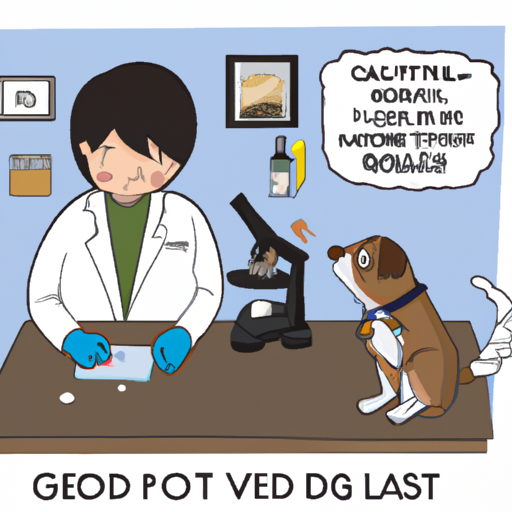Giardia is a common intestinal parasite that can affect dogs and lead to severe health complications if left untreated. As a caregiver, it’s essential that you know how to identify the signs of this condition and the steps involved in testing for its presence. This comprehensive guide will take you through the process in detail.
Understanding Giardia in Dogs
Giardia is a microscopic parasite that can cause a gastrointestinal illness known as giardiasis. Dogs can become infected by ingesting the cysts, which are found in contaminated water or feces. Once inside the dog’s intestines, the cysts open up to release the active form of the parasite.
Symptoms of giardiasis in dogs can include:
- Diarrhea
- Excessive gas
- Abdominal discomfort
- Weight loss
However, some dogs may carry the parasite without showing any symptoms, making it crucial to test for giardia regularly, especially if your dog is frequently in contact with other dogs or has access to areas where contamination may occur.
Collecting a Fecal Sample for Testing
To test for giardia, you’ll need to collect a fecal sample from your dog. Here’s how to do it:
- Wait for your dog to defecate.
- Using a clean plastic bag or a special scoop, collect a sample of the feces.
- The sample should be fresh (less than 24 hours old) and of reasonable size (about the size of a walnut).
- Avoid any contamination with urine, soil or other feces.
- Seal the bag or container and label it with your dog’s name and the date.
- Refrigerate the sample until you can bring it to the vet.
Sending the Sample to the Vet for Testing
Once you’ve collected the sample, take it to your veterinarian as soon as possible. The vet will send the sample to a laboratory where it will be tested for the presence of giardia cysts.
There are a few different tests that the lab may use:
- Direct smear: This involves applying a small sample of the feces onto a microscope slide and examining it for the presence of giardia cysts.
- Fecal flotation: This test uses a solution to cause the giardia cysts to float to the top, where they can be collected and examined.
- Enzyme-linked immunosorbent assay (ELISA): This test uses antibodies to detect the presence of giardia antigens in the feces.
Your vet will inform you of the results once they are available.
Interpreting the Results
When the lab results come back, your vet will inform you if giardia cysts were detected in the sample. It’s important to understand that a negative test does not necessarily mean that your dog is not infected. Giardia cysts are not shed consistently, so they may not be present in every sample. If your dog’s symptoms persist, your vet may recommend additional testing.
| Test Result | Interpretation |
|---|---|
| Negative | No giardia cysts detected. If symptoms persist, further testing may be needed. |
| Positive | Giardia cysts detected. Treatment is necessary. |
Treating Your Dog for Giardia
If your dog tests positive for giardia, your vet will likely prescribe a course of anti-parasitic medication. This medication will need to be administered for a certain period of time, even if symptoms improve before the treatment is complete.
It’s also crucial to clean your dog’s environment thoroughly to prevent reinfection. This includes washing all bedding, toys, and food and water bowls, as well as cleaning any areas where your dog has defecated.
Frequently Asked Questions
Q: How often should I test my dog for giardia?
A: This largely depends on your dog’s lifestyle and risk factors. Dogs that are frequently in contact with other dogs or have access to contaminated areas may need to be tested more often.
Q: Can I get giardia from my dog?
A: Yes, giardia is a zoonotic parasite, meaning it can be transmitted from animals to humans. However, the risk is low if you practice good hygiene.
Q: How long does it take to get test results back?
A: This can vary depending on the lab, but generally, you can expect results within a few days.
Q: What should I do if my dog tests positive for giardia?
A: Your vet will guide you on the best course of treatment. This typically involves medication and a thorough cleaning of your dog’s environment to prevent reinfection.
By understanding giardia and how to test for it, you can ensure the health and well-being of your beloved pet. Always consult with your veterinarian if you have any concerns about your dog’s health.



